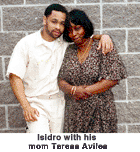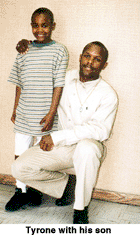 |
Acceptance speech
(Editor's note: The following is
the acceptance speech given by Nora Callahan at the Institute for Policy Studies Letelier-Moffitt Human Rights Award ceremony
in Washington DC on October 16th, 2000.)
 On
behalf of all members of The November Coalition, many who languish
behind prison walls, I thank the Institute of Policy Studies
for their decades-long commitment to human rights both at home
and abroad. An overwhelming tide of drug war prisoners and those
who love them, take great hope in knowing that the Institute's
commitment to expose human rights' abuses has not been dulled
into silence by the pounding drug war rhetoric that has dominated
legislative and media discourse for more than 30 years. On
behalf of all members of The November Coalition, many who languish
behind prison walls, I thank the Institute of Policy Studies
for their decades-long commitment to human rights both at home
and abroad. An overwhelming tide of drug war prisoners and those
who love them, take great hope in knowing that the Institute's
commitment to expose human rights' abuses has not been dulled
into silence by the pounding drug war rhetoric that has dominated
legislative and media discourse for more than 30 years.
That dominance is fast losing steam as the dark failure of the
drug war is brought into the light. The facts are now in, dozens
and dozens of studies finished, innumerable statistics - this
isn't working. Today, many more of our esteemed leaders, some
of them guests here tonight, are committed to ending this war
on drugs that is really a war on people.
We know that the drug war is waged primarily on those who are
our most vulnerable citizens, people of color, the poor and the
sick. They have become the political punching bags and scapegoats
of those who would moralize about some behavior, those who would
rather wage war than seek peaceful, compassionate solutions to
the troubling aspects of illegal drug use.
There was an eerie silence as prison expansion became a prison
industrial complex. My brother was swept into it, during the
first wave of increased imprisonment in the late 1980s, and since
that time, though separated by many miles, together we watched
an epidemic of imprisonment crawl across the country. Our families,
in a sea of millions of people who grieve the losses from imprisonment,
question the injustice, but then are forced to endure a prison
system that has little regard for humanity and fails to meet
basic human needs.
 Nine years ago, Teresa
Aviles' son Isidro was arrested with $52 dollars, no drugs. There
was no evidence against him except the word of a life long criminal.
Police threatened to arrest his family; so he plead guilty to
a cocaine conspiracy and was sentenced to 23 years in federal
prison without hope of parole or earned release. There is no
parole in the federal system. Nine years ago, Teresa
Aviles' son Isidro was arrested with $52 dollars, no drugs. There
was no evidence against him except the word of a life long criminal.
Police threatened to arrest his family; so he plead guilty to
a cocaine conspiracy and was sentenced to 23 years in federal
prison without hope of parole or earned release. There is no
parole in the federal system.
After seven years into that sentence, Teresa received a call
from a woman who would not identify herself, but told Teresa
that her son was sick and not getting medical care. Teresa called
the prison and was told that Isidro was 'fine'. He would be taken
to a hospital for tests, but he was 'fine'. She drove from New
York City to White Deer, Pennsylvania where she was denied a
visit with her son and told that he was 'fine'. He was going
to be taken to a hospital for testing, but he was 'fine'.
The unidentified woman called again to tell her that Isidro had
been taken from the prison. It would be 22 days before she found
her son, and two additional weeks before she could afford to
travel.
Isidro lay unconscious in a hospital bed surrounded by guards,
guards who told Teresa, "You are not allowed to talk to
Mayo Clinic doctors or staff! You can see your son, but for information,
you have to talk to the prison doctor."
She broke the rules. One of the Mayo doctors took her hand and
told her that Isidro was dying. How? What? But before any answers
could be given her, the guards intervened. The prison doctor
never came, never returned this mother's calls, and while in
grief, shock, confusion, with guards surrounding her, she held
her son in her arms to tell him good-bye. Enduring such calamity,
with her job in jeopardy, she clung to one frantic thought. She
would need money to bury her son; she would need money to bury
her son.
She would need money to bury her son.
Eleven days later a prison official called to tell Teresa that
Isidro, because he had less than a year to live, could come home
on what is called a "compassionate release". "Can
you care for him?" she was asked.
Can she care for her son? Of course
she could care for her first-born son. Within the following half-hour
another prison official called. Isidro had died earlier that
day.
The autopsy report, among other discrepancies, documented the
young black man as a white man, and it's been two years since
his death, and, still, Teresa Aviles has questions about the
circumstances of her son's illness and death while in the custody
of the Federal Bureau of Prisons. This mother deserves some answers.
There are too many sons and daughters in our 'American Gulags'
and too many mothers who have no answers to the injustice, the
brutality and death that comes to those in our prisons. American
prisons are not places of rehabilitation; they are places of
torment and despair, as if separation from those you love isn't
punishment enough.
Prisoner Chrissy Taylor writes to say she is tired of being treated
less than  human.
She's doing 17 years, has been in prison since she was 20, has
turned 30, and still has almost 7 years left to serve - 17 years
for going to a hardware store and picking up some chemicals at
the request of a boyfriend. She tells us the guards treat her
like she is stupid. Maybe her actions were stupid once, but does
that mean she is stupid for 17 years? And she's getting tired
of being leered at, 'stripped' of all humanity when she strips
for a 'shakedown'. human.
She's doing 17 years, has been in prison since she was 20, has
turned 30, and still has almost 7 years left to serve - 17 years
for going to a hardware store and picking up some chemicals at
the request of a boyfriend. She tells us the guards treat her
like she is stupid. Maybe her actions were stupid once, but does
that mean she is stupid for 17 years? And she's getting tired
of being leered at, 'stripped' of all humanity when she strips
for a 'shakedown'.
The drug war has eroded our civil rights, and our youth, mostly
black youth, despair behind walls of steel and stone, making
their way from high to medium security prisons, then to 'lows'.
They'll spend their last years behind a fence, or boundary line
they must wait behind as much as 10 or more years to cross. We
have thousands of federal prisoners milling about behind waist
high fences. That is how dangerous these people are! These places
are called the camps.
 Other prisoners won't
follow the course from high security to camps. Tyrone Love was
sentenced to 20 years for a crack conspiracy. In 1996, when Congress
failed to address the disparity of crack and powder cocaine,
there were prison riots, and prisoners were rounded up for transfer
and further punishment after little or no investigation. Tyrone
was beaten, transferred to the federal high security prison in
Colorado and beaten again. Tyrone now lives underground, locked
down for 23 hours a day, always alone. He's been existing like
this for four years, has two more years to serve and will be
released from the "hole" to the street. Tyrone has
kept his sanity, but most do not. Other prisoners won't
follow the course from high security to camps. Tyrone Love was
sentenced to 20 years for a crack conspiracy. In 1996, when Congress
failed to address the disparity of crack and powder cocaine,
there were prison riots, and prisoners were rounded up for transfer
and further punishment after little or no investigation. Tyrone
was beaten, transferred to the federal high security prison in
Colorado and beaten again. Tyrone now lives underground, locked
down for 23 hours a day, always alone. He's been existing like
this for four years, has two more years to serve and will be
released from the "hole" to the street. Tyrone has
kept his sanity, but most do not.
The US now imprisons more than two million people, and 25 percent
of them are drug law violators. The medical community tells us
addiction is a disease, just as treatable as diabetes. But who
is dispensing the cure? Policemen, prosecutors, judges and jailers.
We allow our own kids to take prescription amphetamines such
as Ritalin - yes, an amphetamine, a performance enhancing drug
- while Congress just passed harsher penalties for illegal amphetamines.
We give military aid to Colombia, our tax dollars buying the
helicopters, gunners and bullets that will kill Colombian farmers
because Americans use coca products and marijuana. Innocents
die in no-knock drug raids; yet we still build more prisons,
not treatment centers.
We used to be ashamed. Families like us, who had a loved one
convicted and sentenced for a drug law violation. But we are
leaving and have left the isolation of shame to be no longer
silent. It is our government that should be ashamed!
The November Coalition is both honored and proud of this award.
This recognition has inspired us, but, even more, it renews hope
as we see more and more people come to know our struggle for
freedom and our cry for justice. There is no justice in the war
on drugs.


|


 On
behalf of all members of The November Coalition, many who languish
behind prison walls, I thank the Institute of Policy Studies
for their decades-long commitment to human rights both at home
and abroad. An overwhelming tide of drug war prisoners and those
who love them, take great hope in knowing that the Institute's
commitment to expose human rights' abuses has not been dulled
into silence by the pounding drug war rhetoric that has dominated
legislative and media discourse for more than 30 years.
On
behalf of all members of The November Coalition, many who languish
behind prison walls, I thank the Institute of Policy Studies
for their decades-long commitment to human rights both at home
and abroad. An overwhelming tide of drug war prisoners and those
who love them, take great hope in knowing that the Institute's
commitment to expose human rights' abuses has not been dulled
into silence by the pounding drug war rhetoric that has dominated
legislative and media discourse for more than 30 years. Nine years ago, Teresa
Aviles' son Isidro was arrested with $52 dollars, no drugs. There
was no evidence against him except the word of a life long criminal.
Police threatened to arrest his family; so he plead guilty to
a cocaine conspiracy and was sentenced to 23 years in federal
prison without hope of parole or earned release. There is no
parole in the federal system.
Nine years ago, Teresa
Aviles' son Isidro was arrested with $52 dollars, no drugs. There
was no evidence against him except the word of a life long criminal.
Police threatened to arrest his family; so he plead guilty to
a cocaine conspiracy and was sentenced to 23 years in federal
prison without hope of parole or earned release. There is no
parole in the federal system. human.
She's doing 17 years, has been in prison since she was 20, has
turned 30, and still has almost 7 years left to serve - 17 years
for going to a hardware store and picking up some chemicals at
the request of a boyfriend. She tells us the guards treat her
like she is stupid. Maybe her actions were stupid once, but does
that mean she is stupid for 17 years? And she's getting tired
of being leered at, 'stripped' of all humanity when she strips
for a 'shakedown'.
human.
She's doing 17 years, has been in prison since she was 20, has
turned 30, and still has almost 7 years left to serve - 17 years
for going to a hardware store and picking up some chemicals at
the request of a boyfriend. She tells us the guards treat her
like she is stupid. Maybe her actions were stupid once, but does
that mean she is stupid for 17 years? And she's getting tired
of being leered at, 'stripped' of all humanity when she strips
for a 'shakedown'. Other prisoners won't
follow the course from high security to camps. Tyrone Love was
sentenced to 20 years for a crack conspiracy. In 1996, when Congress
failed to address the disparity of crack and powder cocaine,
there were prison riots, and prisoners were rounded up for transfer
and further punishment after little or no investigation. Tyrone
was beaten, transferred to the federal high security prison in
Colorado and beaten again. Tyrone now lives underground, locked
down for 23 hours a day, always alone. He's been existing like
this for four years, has two more years to serve and will be
released from the "hole" to the street. Tyrone has
kept his sanity, but most do not.
Other prisoners won't
follow the course from high security to camps. Tyrone Love was
sentenced to 20 years for a crack conspiracy. In 1996, when Congress
failed to address the disparity of crack and powder cocaine,
there were prison riots, and prisoners were rounded up for transfer
and further punishment after little or no investigation. Tyrone
was beaten, transferred to the federal high security prison in
Colorado and beaten again. Tyrone now lives underground, locked
down for 23 hours a day, always alone. He's been existing like
this for four years, has two more years to serve and will be
released from the "hole" to the street. Tyrone has
kept his sanity, but most do not.